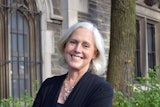 Anne-Marie Campbell
Anne-Marie Campbell
To discuss some of the ways higher education institutions can effectively fundraise, I talked with Anne-Marie Campbell, founder and principal of Hawk Mountain Strategies, a consulting firm focused on fundraising strategy, training and innovation. Campbell has been in nonprofit fundraising for over 15 years and has raised over $20 million for a variety of higher educational institutions including Rutgers, The State University of New Jersey; Rensselaer Polytechnic Institute; the University of Notre Dame; and Skidmore College.
Q: First, let’s start with a fairly obvious question. Is it really getting harder for higher education institutions to fundraise and, if so, is it just the economic conditions we are seeing?
A: In general, fundraising throughout the third sector gets harder each year because of competition for donor’s attention and charitable investment. According to the National Center for Charitable Statistics (NCCS), there were 1.6 million registered nonprofit organizations in the United States in 2010 and the number has continued to grow by approximately 55,000 new nonprofits annually. There are two primary advantages for higher educational institutions. First, colleges and universities benefit from consistent growth of prospective donor populations each year as students graduate and become alumni, new parents join the community, and existing alumni achieve new levels of professional success and look to give back to places of special meaning. Second, given that most institutions of higher learning involve a four-year residential experience, the college or university becomes a “home away from home.” This built-in emotional connection to campus is unique to higher education and can be very helpful, especially when the residential and academic experiences are positive.
Last year was a positive year for higher educational fundraising. As long as there is stability and/or growth in the U.S. economy, fundraising leaders expect increased results in fiscal year 2015.
Q: Of the higher educational institutions where you previously worked, the University of Notre Dame seems most consistent in achieving successful fundraising results. What would you say has been the university’s greatest strength?
A: Notre Dame’s greatest strengths are its focus on tradition and excellence. Alumni, parents and friends feel deep pride in Notre Dame’s history and values; its rigorous undergraduate and graduate academic experience; its environment of faith and Catholic values; the remarkable and ever-changing physical campus; excellence in athletics; and the thoughtful ways the university engages its constituents. From a fundraising perspective, Notre Dame excels through persuasive storytelling campaigns that utilize print, video, social media and events. They recognize the importance of a donor’s emotional connection to their institution and play to it.
Q: What are the primary goals and objectives set in higher educational fundraising?
A: Fundraising goals can vary year to year depending on the priorities of the president and board of trustees. However, in my experience, the most common goals or objectives are:
· Total outright gifts
· Total pledges
o For outright gifts and pledges, sub-goals could include unrestricted gifts, restricted gifts (those designated to a specific interest), gifts to endowment, athletics, etc.
· Number of donors
· Percentage of alumni donors (which is factored into U.S. News and World Report college rankings)
· Capital gifts (earmarked for new construction or renovation)
Q: How do higher educational institutions prioritize fundraising strategies?
A: Annual giving is a top priority for every institution as the funds are able to be used immediately to address areas of greatest need at the college or university. For institutions with more modest endowments, annual giving is often relied upon as a critical part of the school’s annual budget. Annual giving campaigns provide regular contact with potential donors and benefactors and are a vehicle for building and maintaining pride and loyalty to an institution. They are also the first step in engaging and growing a pipeline of future major gift donors.
Other fundraising strategies are either guided by the president’s long-term strategic vision and plan, or by priorities identified by chief academic officers and other members of the president’s cabinet which have been reviewed and approved by the president and/or board of trustees. Strategies are generally reviewed annually.
Q: Finally, what would you say are the most important factors when it comes to consistent, year-to-year success in higher education fundraising?
A: First, the most obvious ― fundraising success is always aided by a good economy. From an institutional perspective, some important factors for success are to plan your work and work your plan; tell a good, compelling story that demonstrates the value and potential impact of a person’s gift; get solicitation mailings and thank-you notes out on time; make sure you specifically ask for money; and get personal ― pick up the phone and say thank you, ask questions of your donors, listen to and remember their answers. Know your institution’s top priorities and pride points. Finally, know your own fundraising goals and progress toward goals. This will help you prioritize your work, adjust strategies as needed and be successful.
Visit Anne-Marie at Hawk Mountain Strategies, www.hawkmt.com.
















